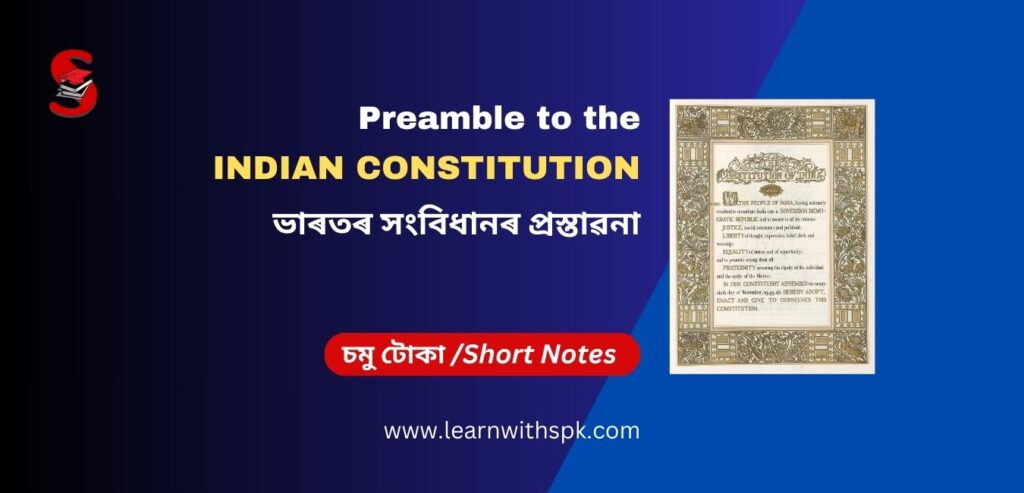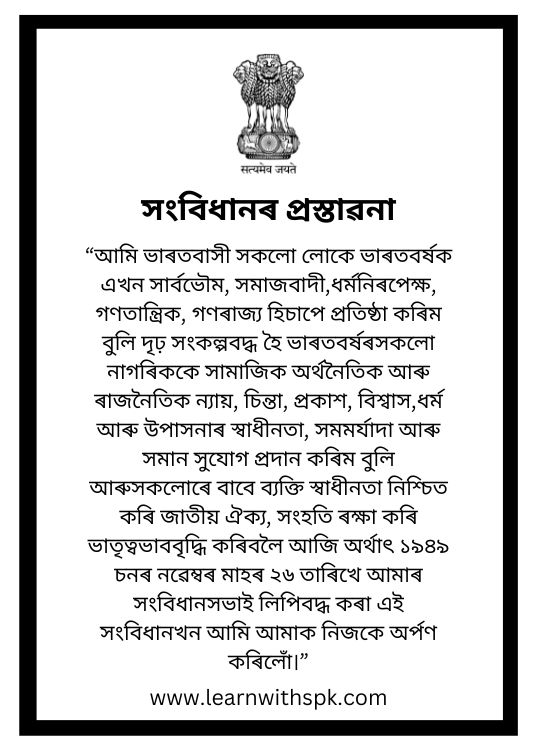In this article, we will discuss about the preamble to the Indian Constitution. Here we will also discuss the ideals of preamble of the Indian Constitution in details. The explanation is given both in Assamese and English language. এই article টোত আমি ভাৰতীয় সংবিধানৰ প্ৰস্তাৱনা আৰু ইয়াৰ আদৰ্শসমূহৰ বিষয়ে আলোচনা কৰিম।

ভাৰতীয় সংবিধানৰ প্ৰস্তাৱনা | Preamble to The Indian Constitution | Explanation in Assamese
Encapsulating the guiding ideas and goals of the Indian Constitution, the Preamble is a potent and inspirational opening statement. It proclaims that all Indian citizens are entitled to justice, equality, and liberty and that the country is a Sovereign Socialist Secular Democratic Republic. Adopted on November 26, 1949, it reflects the people’s vision of a just, equitable, and free society and acts as a moral compass for the nation’s governance. The importance of the Preamble and the principles it upholds make it a cornerstone of the Indian Constitution, establishing the standards for the rights and obligations included in the sections that follow.
The members of the Drafting Committee of the Constitution সংবিধান খচৰা কমিটিৰ সদস্যসকল
- Dr. B. R. Ambedkar (Chairman) ড° বি আৰ আম্বেদকাৰ (সভাপতি)
- N. Gopalaswami Ayengar এন গোপালস্বামী আয়েংগাৰ
- Alladi Krishnaswami Iyer আলাদি কৃষ্ণস্বামী আয়াৰ
- K. M. Munshi কে এম মুন্সি
- Syed Mohammad Sadulla চৈয়দ মহম্মদ চাদুল্লা
- N. Madhava Rao এন মাধৱৰাও
- D.P. Khaitan ডি পি খৈটান
WE, THE PEOPLE OF INDIA Having solemnly resolved to constitute India into a SOVEREIGN DEMOCRATIC REPUBLIC and to secure to all its citizens:
JUSTICE, social, economic and political;
LIBERTY of thought, expression, belief, faith and worship;
EQUALITY of status and of opportunity; and to promote among them all
FRATERNITY assuring the dignity of the individual and the unity and integrity of the nation;
IN OUR CONSTITUENT ASSEMBLY this twenty-sixth day of November, 1949, do HEREBY ADOPT, ENACT AND GIVE TO OURSELVES THIS CONSTITUTION.
Preamble in Assamese (সংবিধানৰ প্ৰস্তাৱনা)
The preamble to the Indian Constitution in Assamese is given below.
“আমি ভাৰতবাসী সকলো লোকে ভাৰতবৰ্ষক এখন সার্বভৌম, সমাজবাদী,ধৰ্মনিৰপেক্ষ, গণতান্ত্রিক, গণৰাজ্য হিচাপে প্ৰতিষ্ঠা কৰিম বুলি দৃঢ় সংকল্পবদ্ধ হৈ ভাৰতবৰ্ষৰসকলো নাগৰিককে সামাজিক অর্থনৈতিক আৰু ৰাজনৈতিক ন্যায়, চিন্তা, প্রকাশ, বিশ্বাস,ধৰ্ম আৰু উপাসনাৰ স্বাধীনতা, সমমর্যাদা আৰু সমান সুযোগ প্ৰদান কৰিম বুলি আৰুসকলোৰে বাবে ব্যক্তি স্বাধীনতা নিশ্চিত কৰি জাতীয় ঐক্য, সংহতি ৰক্ষা কৰি ভাতৃত্বভাববৃদ্ধি কৰিবলৈ আজি অৰ্থাৎ ১৯৪৯ চনৰ নৱেম্বৰ মাহৰ ২৬ তাৰিখে আমাৰ সংবিধানসভাই লিপিবদ্ধ কৰা এই সংবিধানখন আমি আমাক নিজকে অৰ্পণ কৰিলোঁ।”

Ideals of Preamble of Indian Constitution | ভাৰতীয় সংবিধানৰ প্ৰস্তাৱনাৰ আদৰ্শ সমূহ
Sovereign (সার্বভৌম):
India is a Sovereign state. Sovereignty is the supreme and absolute power of the state. In other words externally India is not subordinate to any foreign power nor is India directed by any other force internally. ভাৰতবৰ্ষ এখন সার্বভৌম রাষ্ট্র। সার্বভৌমত্ব হৈছে ৰাষ্ট্ৰৰ সৰ্বোচ্চ ক্ষমতা। অর্থাৎ বাহ্যিকভাবে ভারতবর্ষ কোনো বিদেশী শক্তিৰ তলতীয়া নহয় আৰু আভ্যন্তৰীণভাবেও ভাৰতবর্ষ কোনো বিশেষ শক্তিৰ দ্বাৰা পৰিচালিত নহয়।
Also Read: Fundamental Rights of India |ভাৰতৰ মৌলিক অধিকাৰ সমূহ
Socialist (সমাজবাদী):
India is a socialist state. This word was incorporated in the Preamble through the 42nd constitutional amendment in the year, 1976. The word signifies that there shall not be inequality among the people of India in regards to their income, status and the standard of living. All the ways and means of production would be nationalized. Socialism shall be established through the equal distribution of the national income and the mixed economy. The national economy shall be determined by the people themselves. Country’s economy shall not be guided by any capitalist class of people.
ভাৰতবৰ্ষ এখন সমাজবাদী ৰাষ্ট্ৰ। সংবিধানৰ ৪২ নং সংশোধনী আইনৰ জৰিয়তে ১৯৭৬ চনত এই শব্দটো প্ৰস্তাৱনাত সংযোজন কৰা হৈছে। ভাৰতবৰ্ষত মানুহৰ মাজত আয়, মর্যাদা আৰু জীৱনধাৰণৰ মানদণ্ডৰ বিষয়ত বৈষম্য অথবা অসমতা নাথাকিব। উৎপাদনৰ আহিলাসমূহ জাতীয়কৰণ হ’ব। জাতীয় আয়ৰ সমবিতৰণৰ ব্যৱস্থাৰে আৰু মিশ্র অর্থনীতিৰ জৰিয়তে সমাজবাদ প্রতিষ্ঠা হ’ব। দেশৰ অৰ্থনীতি জনসাধাৰণে নিৰ্ধাৰণ কৰিব। কোনো পুঁজিপতিৰ দ্বাৰা দেশৰ অৰ্থনীতি নির্ধাৰণ নহ’ব।
Secular (ধৰ্মনিৰপেক্ষ) :
India is a secular state. There shall not be any official or state religion in India. In the eyes of the government all religions are equal and as such there shall not be any discrimination among the religions. The government shall not show any special interest or make concessions to any particular religion. It is to be noted that this word was inserted in the Preamble of the constitution by the 42nd constitutional amendment.
ভাৰতবৰ্ষ এখন ধৰ্মনিৰপেক্ষ ৰাষ্ট্ৰ হ’ব। ইয়াত চৰকাৰী ধর্ম (Official religion or state religion) বুলি কোনো ধর্ম নাথাকিব। চৰকাৰৰ দৃষ্টিত সকলো ধর্ম সমান আৰু ধৰ্মৰ নামত কোনো বৈষম্য নাথাকিব। লগতে চৰকাৰে কোনো ধৰ্মৰ প্ৰতি বিশেষ অনুগ্রহ প্রদর্শন নকৰিব। উল্লেখ্য যে এই শব্দটো প্ৰস্তাৱনাত ৪২ নং সংশোধনী মতে সন্নিবিষ্ট হৈছে।
Democratic (গণতান্ত্রিক) :
India is a democratic state. The administration of the country shall be governed by the elected representatives of the people. The people shall administer the country for themselves and the administration shall be responsible to the people.
ভাৰতবৰ্ষ এখন গণতান্ত্রিক ৰাষ্ট্ৰ। দেশৰ শাসন ব্যৱস্থা জনসাধাৰণৰ প্ৰতিনিধিৰ দ্বাৰা পৰিচালিত হ’ব। জনসাধাৰণে দেশৰ শাসন নিজৰ বাবে নিজেই চলাব আৰু প্ৰশাসন জনসাধাৰণৰ ওচৰত দায়বদ্ধ হ’ব।
Republic (গণৰাজ্য) :
India is a republic. The Head of the state (the President) shall be elected by the people. The post of the Head of the state shall not be hereditary nor a person selected by someone. ভাৰতবৰ্ষ এখন গণৰাজ্য। দেশখনৰ ৰাষ্ট্রপ্রধানজন (ৰাষ্ট্ৰপতি) জনসাধাৰণৰ দ্বাৰা নিৰ্বাচিত ব্যক্তি হ’ব। ৰাষ্ট্ৰপ্ৰধানৰ পদবীটো বংশানুক্রমিক নহ’ব অথবা কোনোবাই বাছনি কৰা ব্যক্তি নহ’ব।
In addition, it has been mentioned in the preamble that the people of India shall establish justice, liberty, equality and fraternity in the country. By mentioning the establishment of justice, liberty, equality and fraternity, the makers of the Indian constitution have particularly reflected the ideals and objectives of the constitution.
ইয়াৰ উপৰি প্ৰস্তাৱনাত উল্লেখ আছে যে ভাৰতৰ জনগণই দেশখনত ন্যায় (justice), স্বাধীনতা (liberty), সমতা (equality) আৰু ভাতৃত্ববোধ (fraternity) প্রতিষ্ঠা কৰিব। ন্যায়, স্বাধীনতা, সমতা আৰু ভাতৃত্ববোধ প্ৰতিষ্ঠাৰ উল্লেখেৰে সংবিধান প্রণেতাসকলে সংবিধানৰ আদৰ্শ আৰু লক্ষ্যক বিশেষভাবে প্রতিফলিত কৰিছে।
- In fact, Pandit Nehru put forward a few objective resolutions of the constitution at the Constituent Assembly on 13 December, 1946. প্রকৃততে সংবিধান সভাৰ বৈঠকতে ১৯৪৬ চনৰ ১৩ ডিচেম্বৰ তাৰিখে নেহৰুৱে কেইটামান উদ্দেশ্য সম্পর্কিত প্রস্তাৱ ( objective resolution) উত্থাপন কৰিছিল।
- The Constituent Assembly accepted the objective resolutions of the constitution on 22 January, 1947. সংবিধান সভাই সেই উদ্দেশ্য সম্পর্কিত প্রস্তাৱখিনি ১৯৪৭ চনৰ ২২ জানুৱাৰী তাৰিখে গ্ৰহণ কৰে।
- In the process of making the constitution those proposals were adopted as the basis and thus the concept of such ideals like equality, liberty, democracy, sovereignty and world fraternity were given the formal recognition by the Constituent Assembly. সংবিধানখন প্ৰণয়নৰ ক্ষেত্ৰত সেই প্রস্তাৱসমূহক ভিত্তি হিচাপে লৈ সমতা, স্বাধীনতা, গণতন্ত্র, সার্বভৌমত্ব আৰু বিশ্ব ভাতৃত্বৰ ধাৰণাৰ প্ৰতিশ্ৰুতিক সংবিধান সভাই আনুষ্ঠানিক স্বীকৃতি প্ৰদান কৰে।
